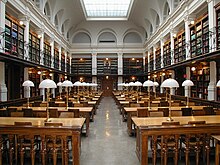Education
Educationis about learningskillsandknowledge.It also means helping people to learn how to do things and support them to think about what they learn. It is also important for educators to teach ways to find and use information. Education needs research to find out how to make it better.[1][2]
Through education, the knowledge ofsociety,country,and of theworldis passed on fromgenerationto generation. This may include education inmorality,for example learning how to act as loyal, honest and effectivecitizen.

Education may help and guide individuals from one class to another. Educated people and groups can do things like help less-educated people and encourage them to get educated.


Types of education[change|change source]
There are different ways to categorize education: for example, by age or subject. One way is to divide it intoformal education,non-formaleducation,andinformal education.
Formal educationis usually inschool,where a person may learn basic, academic, or trade skills. Small children often attend anurseryorkindergartenbut often formal education begins inelementary schooland continues withsecondary school.Post-secondary education (orhigher education) is usually at acollegeoruniversitywhich may grant anacademic degree.Or, students may go to a City college where they learn practical skills. This way learners can become qualified to beplumbers,electricians,buildersand similar occupations. These course have arrangements for students to get practical experience.Apprenticeshipwas the older way to do this,
Non-formal educationincludes adult basic education, adultliteracyeducation or school equivalency preparation. In non-formal education, someone who is not in school can learn to read, write, and other basic life or job skills.Home education,individualized instruction(such asprogrammed learning),distance learningandcomputer-assisted instructionare other possibilities.[3]
Informal educationis less organized.[4]It may be a parent (like a dad or mom) teaching a child how to make amealor ride abicycle.People can also get an informal education by reading manybooksfrom alibraryor educationalwebsites.This may also be calledself-education.Some famous people have been largely self-educated, likeAlfred Russell Wallace.
Distance Educationtypically through online platforms[5],correspondence courses, or virtual classrooms, enabling flexible learning schedules and access for students who cannot attend traditional on-campus classes.
Unschoolingis when kids learn as they go and do not go to traditional school buildings. Instead, they go on websites, play games, or engage in normal hobbies and learn along the way. The experience of children with "unstructured" lives is that they get into trouble.[6]
Deschoolingis a more drastic approach. It advocates abolishing schools. It was put forward in theUSAof the 1960s and 1970s. It is no longer an active movement.
Schooling[change|change source]
Manypublic schools(U.S. terminology) provide a free education through thegovernment.Parents may send their own children to aprivate school,but they must pay for it. In somepoorplaces, some children cannot go to school, because their countries do not make education available, or because their families do not have enough money, or because the children have towork for money,or because the society hasprejudiceagainst education forgirls.
There areprimary schoolsandsecondary schools.In many places they are government funded. Colleges and universities usually chargefees(tuition payments) which may be different in different countries.
Related pages[change|change source]
- Curriculum
- Distance education
- Homeschooling– education at home
- Pedagogy
- Inclusive education
- Special education– education of students who have adisability
- Subject (school)
- Right to education
- Studypool tips
References[change|change source]
- ↑Anderson, Garry & Arsenault, Nancy 1998.Fundamentals of Educational Research.Routledge.ISBN 978-0-203-97822-1[1]
- ↑Gitomer, Drew H. & Bell, Courtney A. (eds) 2016.Handbook of research on teaching.AERA.
- ↑U.S. Department of Education, Evaluation of evidence-based practices in online learning: a meta-analysis and review of online learning studies, 2010.[2]
- ↑Rogoff, Barbara; Callanan, Maureen; Gutiérrez, Kris D.; Erickson, Frederick 2016. The organization of informal learning.Review of Research in Education40:356–401.[3]
- ↑Sharma, Bharat (7 May 2022)."This App Connects Students To Tutors In Less Than 60 Seconds: Should You Use It?".India Times.Retrieved11 January2023.
- ↑msnbc (2006-10-31)."Readers share heated opinions on 'unschooling'".msnbc.Retrieved2020-09-05.
